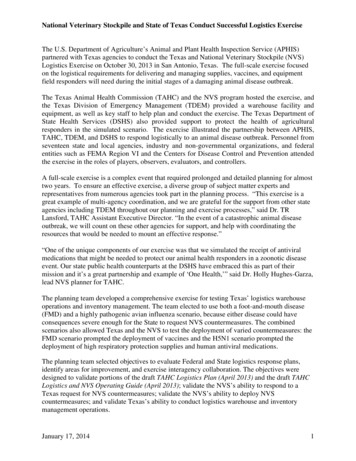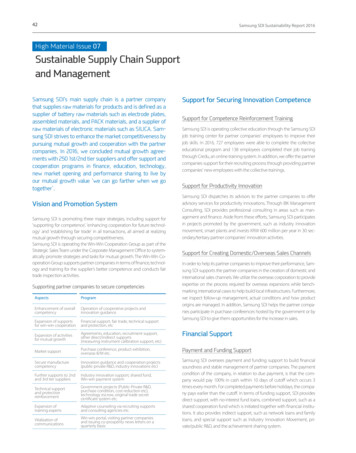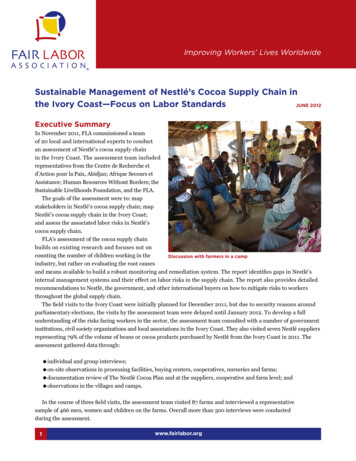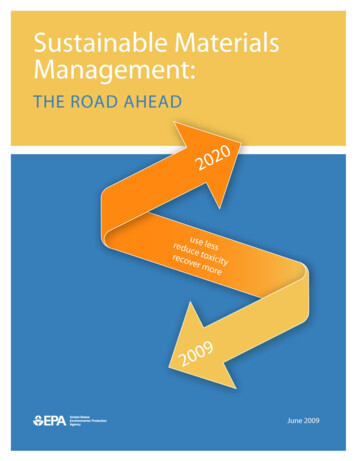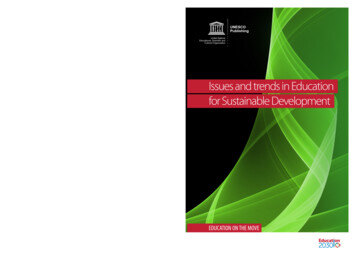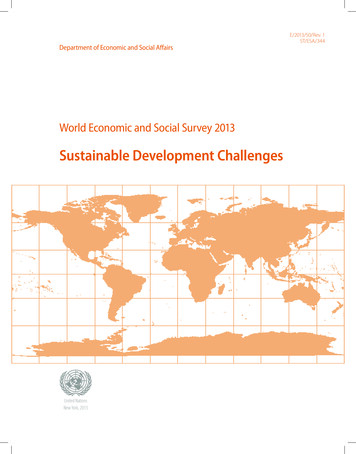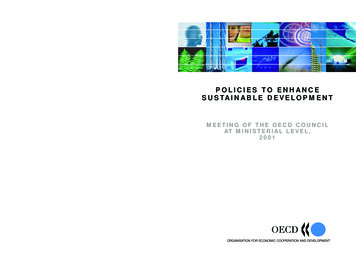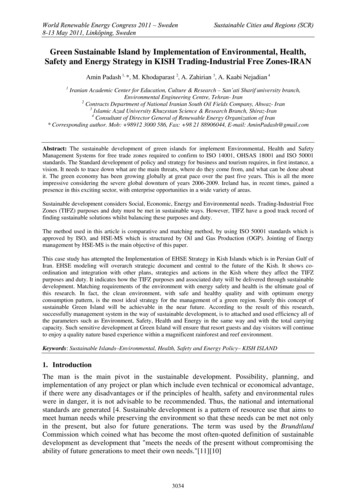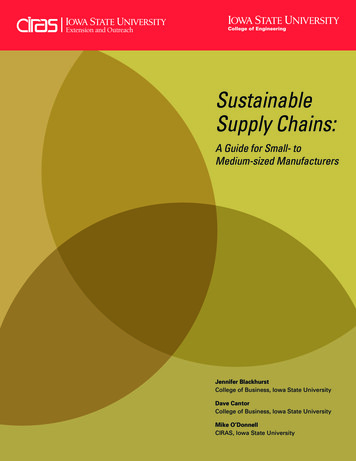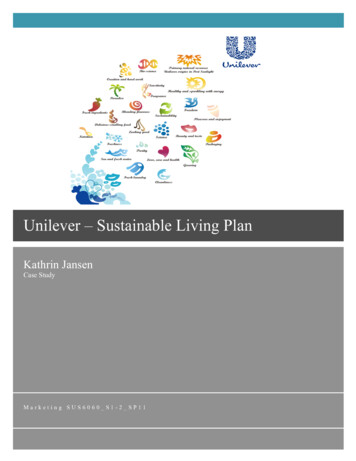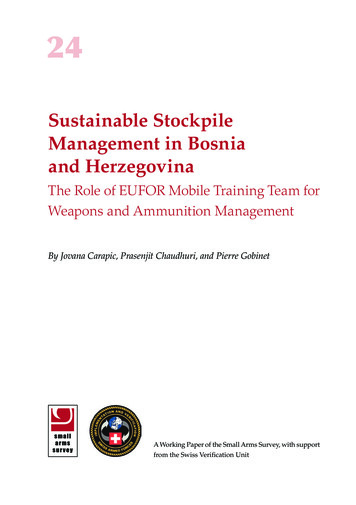
Transcription
24Sustainable StockpileManagement in Bosniaand HerzegovinaThe Role of EUFOR Mobile Training Team forWeapons and Ammunition ManagementBy Jovana Carapic, Prasenjit Chaudhuri, and Pierre GobinetA Working Paper of the Small Arms Survey, with supportfrom the Swiss Verification Unit
CopyrightPrinted version published in Switzerland by the Swiss Armed Forces, ArmedForces Staff, International Relations and Small Arms Survey Small Arms Survey, Graduate Institute of International and DevelopmentStudies, Geneva, 2016First published in October 2016All rights reserved. No part of this publication may be reproduced, stored ina retrieval system, or transmitted, in any form or by any means, without theprior permission in writing of the Small Arms Survey, or as expressly permittedby law, or under terms agreed with the appropriate reprographics rights organization. Enquiries concerning reproduction outside the scope of the above shouldbe sent to the Publications Manager, Small Arms Survey, at the address below.Small Arms SurveyGraduate Institute of International and Development StudiesMaison de la Paix, Chemin Eugène-Rigot 2E1202 Geneva, SwitzerlandCopy-edited by Alex PotterProofread by Stephanie HuitsonCartography by MAPgrafixTypeset in Optima and Palatino by Rick JonesISBN 978-2-940548-30-02Small Arms Survey Working Paper 24
About the Small Arms SurveyThe Small Arms Survey is a global centre of excellence whose mandate is to generate impartial, evidence-based, and policy-relevant knowledge on all aspectsof small arms and armed violence. It is the principal international source ofexpertise, information, and analysis on small arms and armed violence issues,and acts as a resource for governments, policy-makers, researchers, and civilsociety. It is located in Geneva, Switzerland, at the Graduate Institute of International and Development Studies.Established in 1999, the Survey is supported by the Swiss Federal Departmentof Foreign Affairs and current or recent contributions from the Governmentsof Australia, Belgium, Denmark, Finland, France, Germany, the Netherlands,New Zealand, Norway, Sweden, the United Kingdom, and the United States,as well as from the European Union. The centre is grateful for past supportreceived from the Governments of Canada and Spain, as well as from foundations and many bodies within the UN system.The Survey has an international staff with expertise in security studies, politicalscience, law, economics, development studies, sociology, and criminology, andcollaborates with a network of researchers, partner institutions, non-governmentalorganizations, and governments in more than 50 countries.Small Arms SurveyMaison de la PaixChemin Eugène-Rigot 2E1202 GenevaSwitzerlandt 41 22 908 5777f 41 22 732 2738e sas@smallarmssurvey.orgw www.smallarmssurvey.orgCarapic, Chaudhuri, and Gobinet Sustainable Stockpile Management in BiH 3
Online resourcesMost Small Arms Survey publications are available for free download fromour website at www.smallarmssurvey.org/publications.Many Small Arms Survey publications are available in languages otherthan English at www.smallarmssurvey.org/languages.A range of online tools concerning small arms and armed violence—includingweapons identification and tracing resources, data-rich maps, and interactive guides—can be accessed at www.smallarmssurvey.org/tools.To receive regular email updates on publications and other news, sign upfor eAlerts at www.smallarmssurvey.org/eAlerts.Follow the Small Arms sLet us know what you thinkWe are keen to receive feedback on how Small Arms Survey research is used,and how we can improve our publications and other resources. Please fillout a short questionnaire at www.smallarmssurvey.org/feedback or emailany comments or suggestions to feedback@smallarmssurvey.org.Icons by Freepik from www.flaticon.com4Small Arms Survey Working Paper 24
ContentsList of boxes, figures, and tables . 7List of abbreviations . 8About the authors and contributors . 10Authors10Contributors11Acknowledgements . 12Introduction . 13Stockpile management capacity building in post-conflict settings:experiences from BiH . 17The post-war control and management of weapons andammunition stockpiles in BiH17EUFOR Operation ALTHEA: focusing on capacity buildingand training19The MTT Project: inception and mandate21MTT Project: a comprehensive approach to capacity building . 27Conducting assessment visits27The ‘capacity-building and training’ project plan30Training-the-trainers: building organizational capacitythrough modular courses32Structural adaptations for host nations36Coherence between training and equipment37A holistic approach to weapons and ammunition LCM . 38Coordinating national and international stakeholders38Host-nation ownership of weapons and ammunition LCM41Carapic, Chaudhuri, and Gobinet Sustainable Stockpile Management in BiH 5
Facilitating ammunition inventory and surveillance in BiH43Surplus disposal46Conclusion: lessons learned and ways forward . 50Endnotes.References6.Small Arms Survey Working Paper 245355
List of boxes, figures, and tablesBoxes1A note on methodology152Changing focus: operational mandates for EUFOR ALTHEA203Findings of initial assessment visits, 2010294Surplus disposal and the Doboj Agreement47Figures1A comprehensive approach to sustainable capacity building2Train-the-trainer approach28(3M Model: moderating, mentoring, monitoring)333Age and risk analysis of AFBiH ammunition stocks, 2007–14444AFBiH ammunition inspected in 2015, by weight (tonnes)5and location (ASS)45Quantity of ammunition disposed of annually in BiH, 2006–1548Tables1UEMS incidents in BiH, 1979–20152MTT-organized courses handed over to the AFBiH up to18the end of 2015233Activities in support of MTT-organized courses244MTT Project and TRADOC courses, 2011–15365Conventional ammunition and small arms and light weaponssurplus stockpiles declared by the BiH MoD, 2008–1543Carapic, Chaudhuri, and Gobinet Sustainable Stockpile Management in BiH 7
List of abbreviationsAFBiHArmed Forces of Bosnia and HerzegovinaASSAmmunition storage siteAWEAmmunition, weapons, and explosives/Ammunition, Weapons, and Explosives (Task Force)AWE MasterMaster Plan on Ammunition, Weapons, and ExplosivesPlanBiHBosnia and Herzegovina (Bosne i Hercegovine)DaytonGeneral Framework Agreement for Peace in Bosnia andAgreementHerzegovinaDIFDefence Industry FactoryDTRA(US) Defense Threat Reduction AgencyESHExplosives storehouseEUFOREuropean Union ForceEWGExpert Working GroupFBiHFederation of Bosnia and HerzegovinaHQHeadquartersIFORImplementation ForceLCMLife-cycle managementMoDMinistry of DefenceMTTMobile Training TeamNATONorth Atlantic Treaty OrganizationOB/ODOpen burning/open detonationOSCEOrganization for Security and Co-operation in EuropePSSMPhysical security and stockpile managementRASRRegional Approach to Stockpile Reduction8Small Arms Survey Working Paper 24
RSRepublika SrpskaSAWADSpecial advisor on weapons and ammunition disposalSEESouth-east EuropeSEESACSouth Eastern and Eastern Europe Clearinghouse for theControl of Small Arms and Light WeaponsSFORStabilization ForceSOPStandard operating procedureTRADOCTraining and Doctrine CommandUEMSUnplanned explosions at munitions sitesUNDPUnited Nations Development ProgrammeVF BiHVojska Federacije Bosne i HercegovineVRSVojska Republike SrpskeCarapic, Chaudhuri, and Gobinet Sustainable Stockpile Management in BiH 9
About the authors and contributorsAuthorsJovana Carapic is an associate researcher at the Small Arms Survey. She isengaged in various projects in the field of physical security and stockpile management (PSSM), capacity building and training for PSSM, and organizedcrime- and armed violence-related work in the Western Balkans (and beyond).Much of her work is done under the framework of the Regional Approach toStockpile Reduction (RASR) initiative. She holds a doctorate in political sciencefrom the Graduate Institute of International and Development Studies, Geneva.Prasenjit Chaudhuri has headed the Swiss Verification Unit since 2005 and hasbeen deputy head of the Euro-Atlantic Security Cooperation Division in theSwiss Department of Defence since 2008. He is a colonel in the Swiss ArmedForces and has a degree in political science and history from the Universityof Zurich (lic. phil.). In his current position he is in charge of conceptual andcontent-related aspects of the small arms and ammunition projects of the SwissArmed Forces in multilateral frameworks. He also deals with normative andimplementation questions of LCM in multilateral forums and on national coordination boards. Since 2006 he has been actively engaged as team leader forassessment visits at weapons and ammunition storage sites, as course directorfor multinational PSSM training courses, and as a keynote speaker on the safeand secure management of arms and ammunition at international workshopsand conferences.Pierre Gobinet was a researcher for the Small Arms Survey until 2015. Duringhis time at the Survey he coordinated various projects in the ‘Weapons andMarkets’ cluster and the RASR initiative. He has authored several reports for theSurvey on the production, procurement, and transfer of small arms and lightweapons ammunition. As a former captain in the French Gendarmerie he spenttime as an operations officer at Kosovo Force’s Multinational Specialized Unit inPristina, Kosovo, and as a liaison officer at Europol in The Hague, the Netherlands.10Small Arms Survey Working Paper 24
ContributorsThe report has also benefited from the considerable substantive contributionsof Martin Trachsler and Etienne Huber.Martin Trachsler is special advisor on weapons and ammunition disposal(SAWAD) to the commander of EUFOR. Serving in this capacity since January2013, his role is to oversee the design and implementation of Ammunition,Weapons, and Explosives Master Plan activities in Bosnia and Herzegovina(BiH). Holding the rank of colonel in the Swiss Armed Forces, he is also thehead of the EUFOR Mobile Training Team (MTT) 2.1.6.1, which is responsiblefor the PSSM capacity building and training of the Armed Forces of Bosnia andHerzegovina (AFBiH).Etienne Huber is a project manager at the Swiss Department of Defence, ArmedForces Staff, International Relations Defence. He coordinates regional militarycooperation projects, including their embedment in the multilateral frameworks in which the Swiss Armed Forces are active (the UN, OSCE, and EAPC/PfP). Prior to joining the Armed Forces Staff he was deployed with the UNMission in Mali and worked as a weapons and ammunition managementofficer. He helped to develop the project on the safe and secure management ofstockpiles of weapons and ammunition for the Malian Defence and SecurityForces. Previously he was employed as a consultant for a private sector consulting firm. He received his PhD in business administration from the University of Bern, Switzerland. He also holds a master’s in international affairs andgovernance from the University of St. Gallen, Switzerland.Carapic, Chaudhuri, and Gobinet Sustainable Stockpile Management in BiH 11
AcknowledgementsThis study, which was completed between September 2014 and December2015, benefited from many individuals working in BiH on issues pertainingto PSSM capacity building and training. The research team is grateful to theBiH Ministry of Defence (MoD), the Joint Staff, and numerous other membersof the AFBiH. Joint Staff representatives provided invaluable support and guidance to the research team during the various field visits to Sarajevo. Particularthanks go to Major General Senad Masovic, Major General Mirko Tepsic, ColonelEdin Fako, and the members of the Ammunition, Weapons, and ExplosivesTask Force.Members of international and regional organizations, especially OSCE andUNDP, also supported the research team by providing background information and logistical support, and navigating the complex field of weapons andammunition management in BiH. Members of the Swiss Verification Unit andEUFOR MTT 2.1.6.1 facilitated access to the BiH MoD and Joint Staff, and provided political, technical, and logistical support during the field visits andthroughout the research period.Special thanks go to Paul Holtom and Vincent Choffat for their reviews ofearlier drafts, and Eric Berman and Benjamin King for their guidance andcomments. The authors are also grateful to several people for making thispublication possible: Glenn McDonald for content editing, Melanie Wahl forthorough fact-checking, Alex Potter for copy-editing, and Alessandra Allen forsupervising the publication process. All errors are those of the authors.12Small Arms Survey Working Paper 24
IntroductionIn post-conflict settings such as Bosnia and Herzegovina (BiH), inadequateweapons and ammunition stockpile management and the lack of systematicammunition surveillance can pose substantial risks. These risks include thedegradation and self-ignition of ammunition, leading to unplanned explosionsat munitions sites (UEMS), and large quantities of excess (and often improperlyMap 1 AFBiH ammunition and weapons storage sitesC R OAT I AGrabežBihacRabic, DerventaDemilitarization Facility,Trom DobojBanja LukaBrckoDobojKljucKozlovacCROTraining andDoctrine command(TRADOC), TravnikATIAdZvornikTBT, VisokoGornji VakufSarajevoBOSNIA ANDHERZEGOVINAriaSERBIAZenicaKrupa, HadžićiATuzlaKula 1 and 2, Mrkonjić GradGorazdeMostarticAmmunitionstorage siteWeaponsstorage siteInternationalboundaryCapital cityGabela, ČapljinaSeaMONTENEGROTrebinje0km50Carapic, Chaudhuri, and Gobinet Sustainable Stockpile Management in BiH 13
secured) weapons potentially fostering illicit transfers. The establishment ofsustainable weapons and ammunition life-cycle management (LCM) serves toreduce these risks.Establishing sustainable weapons and ammunition LCM systems is a longterm process. It comprises the simultaneous development and implementationof a comprehensive (multi-level) approach to capacity building for physicalsecurity and stockpile management (PSSM) in a country’s armed and security forces, and a holistic (cross-dimensional) approach to the LCM of stockpiles. This is a complex endeavour. It not only pertains to the internal processof national ownership and the development of relevant structures and procedures, but often involves external assistance by various civilian, military,bilateral, and multilateral partners.This Working Paper describes the role of PSSM capacity building and training in facilitating the development of a sustainable LCM system in BiH. Whilethe European Union Force (EUFOR) plays a key role in the overall coordination of the LCM process, the EUFOR ‘Weapon and Ammunition Storage SiteManagement’ Mobile Training Team (hereafter referred to as the MTT Project)is leading capacity-building activities as part of this process.1The paper draws on the 2015 Small Arms Survey Yearbook chapter, ‘Less“Bang” for the Buck: Stockpile Management in South-east Europe’. Insightsfrom the chapter are supplemented with desk-based and field research carriedout by the Small Arms Survey research team, and the extensive technical expertise of personnel from the MTT Project and the Swiss, Austrian, and Swedisharmed forces (see Box 1). The paper also outlines a possible approach for futurePSSM field activities in South-east Europe and elsewhere.The paper has several key findings: PSSM and weapons and ammunition LCM should be integrated into postconflict rehabilitation efforts and peace support operation mandates, notonly because of the risks related to unsecured and unsafe stockpiles (such asunplanned explosions or diversion), but also because the (re)installation of asustainable weapon and ammunition LCM system is a long-term endeavour.LCM therefore needs to be tackled at the earliest stage possible. In post-conflict settings the restructuring of the armed forces often resultsin demilitarization, stockpile maintenance, and security personnel retiring14Small Arms Survey Working Paper 24
or finding employment in the private sector. This reduces the capacity ofcountries to deal with the threats posed by poorly secured and managed weapons and ammunition stockpiles. Capacity building for weapons and ammunition storage site managementneeds to be comprehensively implemented. In particular, international assistance needs to take a multi-level approach to capacity building, one that goesbeyond training and includes the donation of technical equipment and relatedoperating and maintenance skills. For international assistance to successfully establish, develop, and implementa sustainable LCM system, political buy-in by the host nation (especially atthe various levels of the Ministry of Defence (MoD) and the armed forces(tactical, operational, and strategic) is essential. A road map with a clearly established end-state and plan of action is key tothe creation of a sustainable weapons and ammunition LCM system. Thisincludes the establishment of decision-making and implementation bodiesunder high-level national authority, such as strategic and coordination boards.Box 1 A note on methodologyThis paper is based on a combination of desk and field research. Desk research involved areview of available information (previous Small Arms Survey publications and official back ground documents) pertaining to the emergence of the MTT Project in BiH. Field researchfocused on the work of this project in BiH, especially as it relates to the transfer of responsi bility for PSSM capacity building and training from international stakeholders to the BiHauthorities, and how the project complements the activities of other international partners.Various approaches were applied during the field research: With the support of MTT Project personnel and the Swiss Armed Forces, more than 25key stakeholder interviews were conducted with members of the AFBiH and multilateralactors operating in BiH; the interviews took place from September 2014 to December2015 in Sarajevo, BiH. Members of the MTT Project organized field visits to EUFOR Headquarters (HQ) locatedat Camp Butmir, Sarajevo, and the AFBiH Training and Doctrine Command (TRADOC)in Travnik. The
head of the EUFOR Mobile Training Team (MTT) 2 .1.6.1, which is responsible for the PSSM capacity building and training of the Armed Forces of Bosnia and Herzegovina (AFBiH). Etienne Huber is a project manager at the Swiss Department of Defence, Armed Forces Staff, Internat
